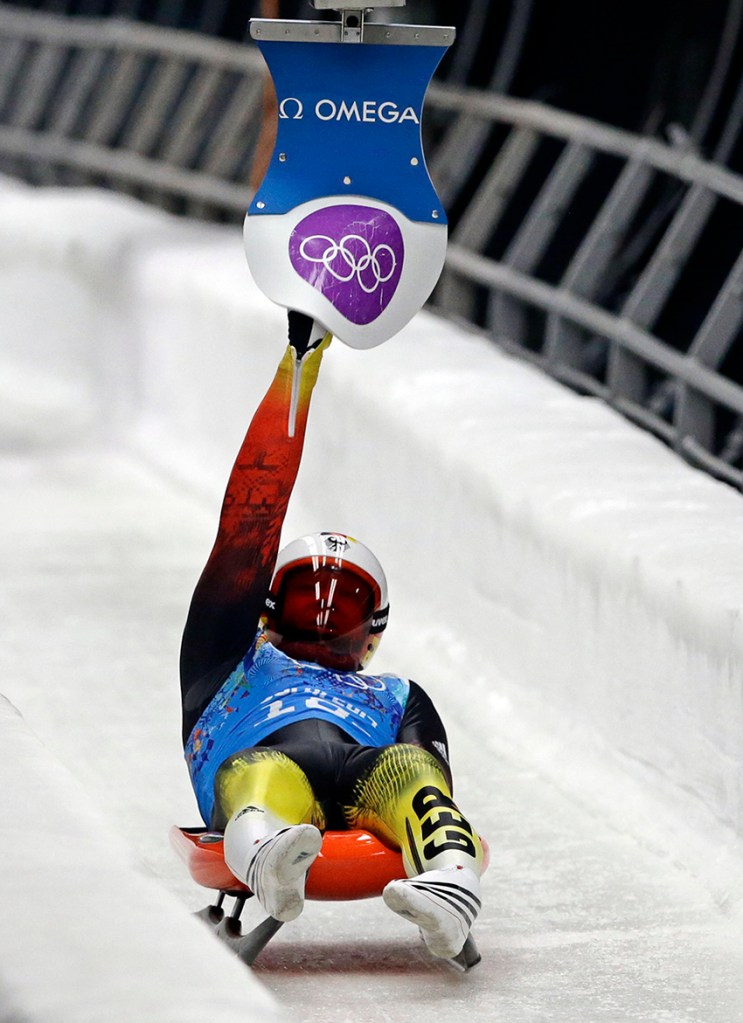KRASNAYA POLYANA, Russia — Men’s gold. Women’s gold. Doubles gold.
And now, team relay gold.
Dominant again — more dominant than ever, really — Germany won the inaugural Olympic luge team relay on Thursday, with three already-golden champions joining forces to celebrate one more time at the Sochi Games.
With IOC President Thomas Bach looking on, Felix Loch, Natalie Geisenberger and the doubles team of Tobias Wendl and Tobias Arlt finished their runs in 2 minutes, 45.649 seconds, good enough to beat Russia for the title by 1.030 seconds. They wrapped their arms around each other, jumped up and down in unison and chanted in triumph when it was over.
“Greatest feeling ever,” Geisenberger said.
Latvia won the bronze.
It’s the 31st luge gold medal for Germany, going back to the days of when the nation was split into east and west. All other nations have 13. And this year, instead of seeing Germans contend for three golds, everyone else had to watch them get four, with the relay now a medal sport.
“All of us need a few days to realize what we did here,” Loch said. “It was a perfect luge week for the Germans.”
Loch won the men’s singles title, Geisenberger the women’s competition and Wendl and Arlt claimed gold in doubles already in Sochi. They’re all coached by German great Georg Hackl, and there’s a luge joke that Germany’s national team is split into those who hail from Hackl’s part of the country, and those who hail from anyplace else.
“Georg Hackl does their sleds. He does everything. It’s all Georg Hackl,” said U.S. doubles luger Christian Niccum, part of the American relay entry that finished sixth. “He’s the wizard.”
And while the Germans said hello to more gold, luge got to presumably say farewell to two legends.
Albert Demchenko has said he was retiring after the Olympics in his native Russia, and teamed with Tatyana Ivanova and the doubles team of Alexander Denisyev and Vladislav Antonov to finished second. And Armin Zoeggeler — who won a record six Olympic medals, never leaving a games without one — competed on luge’s biggest stage for the final time for Italy, which finished fifth.
“Yes, it is tough,” Zoeggeler said, asked about walking away from the sport he’s dominated for so long. “It’s been a long time. For me, it’s time.”
Demchenko and Zoeggeler were second and third, respectively, behind Loch at the Sochi Games. Not bad for a pair of 40-somethings, who now leave a big void at the top of the sport.
Russia was 0.616 seconds ahead of Latvia in the race for second. And for Latvia, the medal was its second in luge at the Sochi Games — matching its output from all other Olympic appearances in luge combined.
The team relay combines one men’s slider, one women’s slider and one doubles team from each nation. They all get one heat, and sliders have to smack a large pad after crossing the finish line to trigger a signal that it’s time for the next sled on their team to enter the track.
Germany will surely be dominant for years to come, but other sliders think the team relay is a chance to at least fight for more success.
“Since I won worlds in 2009, other countries have been slowly inching their way up,” women’s Olympic bronze medalist Erin Hamlin of Remsen, N.Y. said. “I just hope it can keep happening.”
Thursday’s event, the last luge race of the Sochi Games, was held a few hours after a forerunning bobsled before two-man training struck a track worker in the finish area. The worker was airlifted to a hospital, but racing went on as scheduled.
Send questions/comments to the editors.


